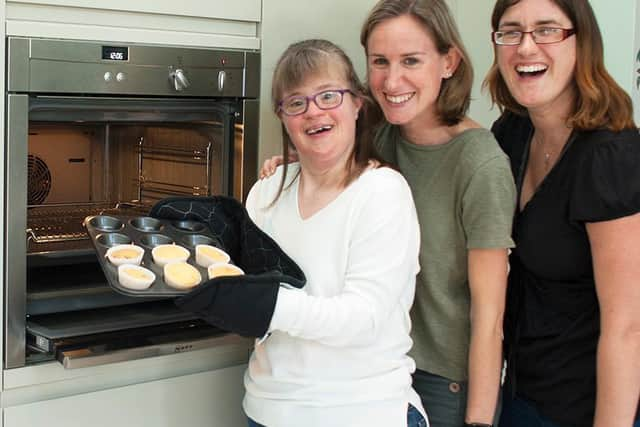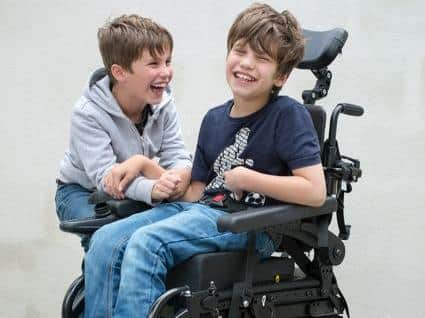Sibs: Supporting the brothers and sisters of disabled people in Preston


The UK’s only charity dedicated to offering support to people who are or have grown up with a disabled sibling, Sibs recognises that the lived experience of those who have brothers or sisters with special needs is vastly different to that of many others.
And despite having just four members of staff (three of them part-time) and not receiving any statutory funding, they’re determined to help.
Advertisement
Hide AdAdvertisement
Hide AdEstablished in 2001 by Monica McCaffrey in response to a growing demand for information on how to support siblings of disabled children, Sibs received charitable status in 2002.


It has been running workshops and developing crucial resources for parents, siblings, and professionals for almost two decades in recognition of the fact that those who grow up with a disabled sibling often get less attention from parents and have distinct worries and responsibilities to their peers.
Offering support and info on disability and emotional management as well as access to their online service YoungSibs, Sibs also works with adult siblings - a population demographic which rarely receives just recognition for its vital role and expertise - and supports a network of 11 local peer support groups across the country.
Keen to help, Helen - whose brother Steven Charters, 40, has Down syndrome - travelled to London to attend a training day and set up the Preston Adult Sibling Group, which held its first meeting last week.
Advertisement
Hide AdAdvertisement
Hide Ad“It’s a crucial provision: if I could’ve done something like this 20 yeas ago it’d have been brilliant,” said Helen, 41, who lives in Cottam. “I’m not an expert, I just get everybody in the same place, but we have the sort of conversations you didn’t know you needed to have. We more than filled two hours just chatting about stuff we’ve all experienced and our concerns.


“That feeling of being in a community really lifts you: sharing with somebody who gets it is so valuable,” she added. “We learned a lot from each other. It’s gotten off to a really good start.”
Sib’s CEO, Clare Kassa, whose brother also has a learning disability, says that Sibs members are ‘inspired by their brothers and sisters’ and that the charity is ‘a fantastic organisation’.
“The sibling experience is different from that of parent carers: we carry worries and have to make different choices in our lives because we’re concerned about our brothers and sisters’ well-being,” she explained. “Lots of siblings will have had difficulties; coming second in terms of attention as a child has an impact.
Advertisement
Hide AdAdvertisement
Hide Ad“In the groups, there’s a huge amount of connection and knowledge: other people have lived your journey, and people have described how amazing it is to meet other siblings,” she added, with Sibs offering phone and email support to adult siblings.
The charity also provides vital advocacy for people who may be reaching a stage when they have elderly parents, children of their own, and work commitments to juggle.
“Adult siblings are a hidden group of carers: they’re invisible,” said Clare, 50, who has worked for Sibs for 10 months. “For many it’s not full-time care, but it’s vigilance and keeping an eye on things.
“The impact of austerity has hit carers hard and siblings too, as they’re the ones who step in when things go wrong or services change,” he added.
Advertisement
Hide AdAdvertisement
Hide AdSibs’ mission is clear: to promote the needs of adult siblings and connect them to like-minded communities.
And that kind of community can make the world of difference. “It’s so nice to talk to somebody who knows where you’re coming from,” said Helen.
To register an interest in attending a meeting of the Preston Adult Sibling Group, go to www.sibs.org.uk/support-for-adult-siblings/adult-sibling-support-groups/Sibs is also involved in a research collaboration with the University of Warwick. The study is searching for adults who have a sibling with a learning or developmental disability (including autism, cerebral palsy, fragile X syndrome, Down syndrome, genetic disorders, etc...) to take part in our survey study.
The study will focus on the siblings' well-being, experiences, and relationship with their brother or sister and is geared towards understanding the social, psychological, and health outcomes of adult siblings to help develop relevant support to improve outcomes and relationships between siblings.
Advertisement
Hide AdAdvertisement
Hide AdTo take part, participants must be 18 or over, have a sibling with a learning or developmental disability, and reside in the UK. Those interested can find out more at https://warwick.co1.qualtrics.com/jfe/form/SV_9sCVIC1HdmP3Qgd. Any questions can be directed to Nikita Hayden via email at [email protected]